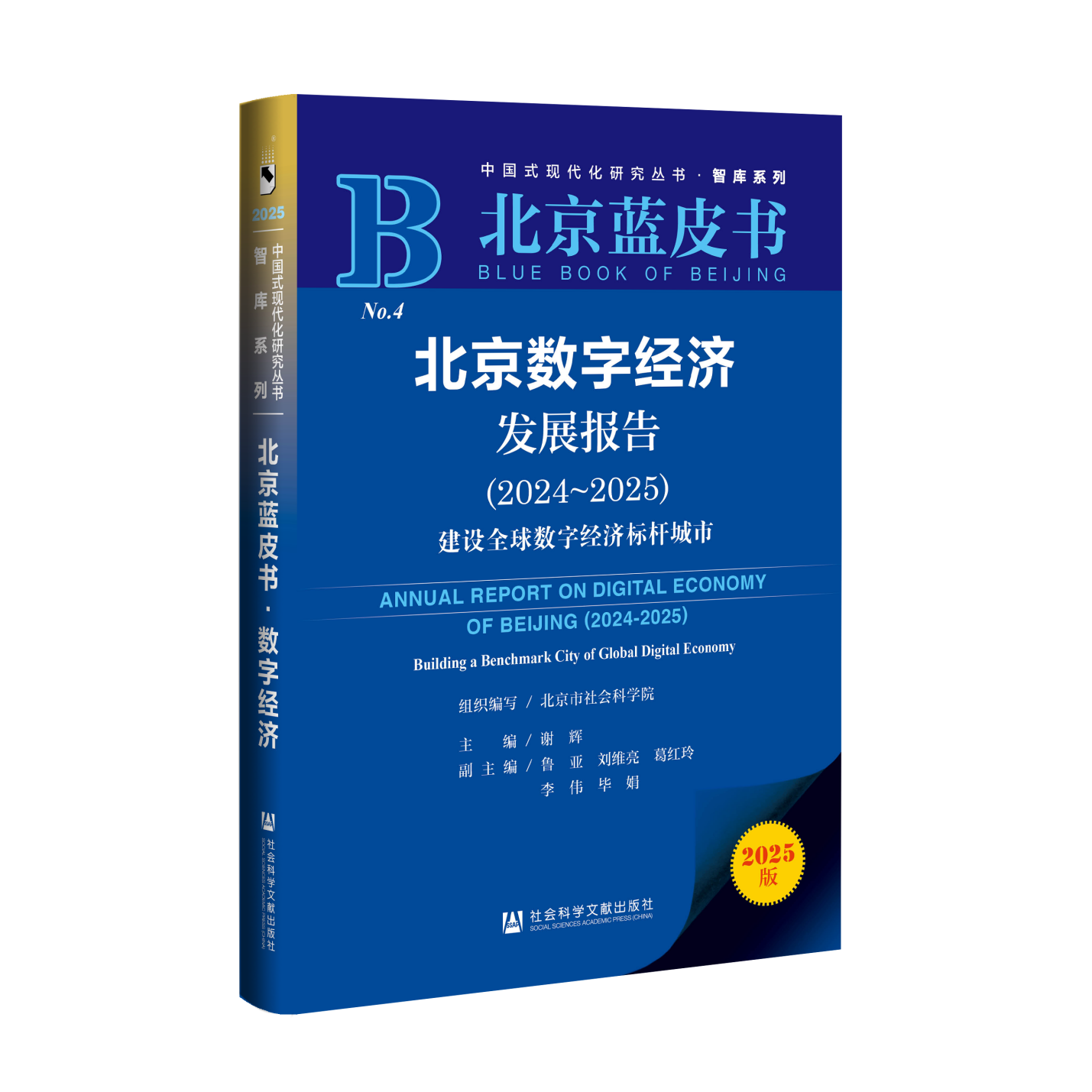更多
"Beijing Digital Economy Development Report (2024-2025)" Blue Book Released in Beijing
2025-07-08
On July 5, 2025, at the achievement release conference of the "2025 Global Digital Economy Conference", the Beijing Academy of Social Sciences released the "Beijing Digital Economy Development Report (2024-2025)" blue book (hereinafter referred to as the "blue book").

The blue book continues the annual theme of "Building a Global Digital Economy Benchmark City" and consists of seven chapters: General Report, Evaluation Chapter, Theory Chapter, Special Topic Chapter, Comparison Chapter, Outlook Chapter, and Appendix. A research team, jointly formed by the Beijing Academy of Social Sciences and multiple institutions including Tsinghua University, the Chinese Academy of Social Sciences, the China Academy of Information and Communications Technology, Beijing Technology and Business University, the National Industrial Information Security Development Research Center, the China Unicom Research Institute, and Shitong Consulting, has tracked the construction and development of Beijing as a global digital economy benchmark city for four consecutive years. It conducts relevant theoretical and practical explorations, plays the role of a think tank, and serves the high-quality development of the digital economy.
The blue book research reveals that the overall index of Beijing as a global digital economy benchmark city has increased compared to the previous year, ranking second globally and being classified as a "globally leading city". Beijing performs excellently in aspects such as data element allocation capability, digital industry leadership, and digital innovation source capability.
Meanwhile, the blue book systematically presents the new trends and characteristics of Beijing's digital economy development. Research shows that Beijing has vigorously promoted the development of the digital economy, achieving remarkable results in digital infrastructure, industrial cultivation, market construction, and international cooperation, and continuously releasing new momentum. Beijing has focused on the development of the artificial intelligence industry, with standards as the guide, relying on policy innovation, industrial upgrading, and computing power support to achieve coordinated breakthroughs, enhancing its strength as the "No. 1 Artificial Intelligence City" in China. Beijing has contributed a "Chinese solution" to global intelligent transportation and urban governance through the integrated application of "dual-intelligence" cities. The construction of the high-level autonomous driving demonstration zone has steadily advanced, promoting technological research and development and industrial integration through planning guidance, policy innovation, and multi-party cooperation, and building a global benchmark for the autonomous driving industry. A development pattern of policy coordination, resource sharing, and information exchange has been formed in benchmark technology fields. Continuous efforts have been made in key areas such as basic software, brain science, and artificial intelligence. An independent and controllable ecosystem has been built in key technical fields to enhance the competitiveness of the digital economy. The digital industry innovation index leads the country, ranking in the first echelon together with Guangdong, Zhejiang, Jiangsu, and Shanghai, demonstrating leading advantages and coordinated development vitality. Beijing attaches importance to the training and introduction of digital economy talents such as those in artificial intelligence, strengthens policy guarantees, and enhances talent support. Through the "One District, One Product" strategy, it promotes regional differentiated development, creates characteristic digital economy sectors, continuously improves the regional coordination mechanism, and actively leads the coordinated development of the digital economy in the Beijing-Tianjin-Hebei region and the whole country. In the field of digital economy going global, efforts are made to build a development platform. By establishing facilitation mechanisms, improving port functions, and innovating regulatory guarantee models, the overseas environment is continuously optimized to help enterprises expand the global market and form an open and shared digital trade ecosystem. It has deeply promoted digital and intelligent transformation, and reshaped the development pattern through the integration of the digital economy and scientific and technological innovation. Through the linkage of algorithms, computing power, and data elements, it empowers industrial upgrading and manufacturing transformation, with total factor productivity continuously improving, leading industries to upgrade to high-end and intelligent levels, and opening a new chapter driven by digital intelligence. From a global perspective, with innovation, technology, infrastructure, market, and governance as pillars, Beijing continues to make efforts in promoting the inclusive application of digital technologies, improving the digital inclusive ecosystem, and enhancing the warmth of digital services, contributing a replicable "Beijing plan" to the construction of global digitally friendly cities.
Looking ahead, Beijing will continue to make breakthroughs and innovations, continuously leading the high-quality upgrading of the digital economy to a "digital-intelligent economy"; strengthen the integration of digital infrastructure construction and technological innovation, accelerate the optimal layout of the computing power system, promote in-depth market-oriented reform of data elements, and build an internationally competitive industrial ecosystem. It will further consolidate the talent foundation in cutting-edge fields such as artificial intelligence, explore more diversified industrial integration application scenarios, and improve the refinement and intelligence level of urban governance. With the continuous improvement of top-level design and institutional innovation, Beijing will strengthen exchanges and cooperation with domestic and foreign parties, continue to export the exemplary "Beijing plan", and actively build a new benchmark for global digital economy and smart city construction.
The "Beijing Digital Economy Development Report (2024-2025)" blue book is a key brand think tank achievement continuously built by the Beijing Academy of Social Sciences. The research team of the Beijing Academy of Social Sciences will continue to track the latest progress in the construction of Beijing as a global digital economy benchmark city, conduct in-depth research on theoretical and practical issues in the development of the digital economy, and present an annual research report to readers. As an annual report released for the fourth consecutive year, this achievement will continue to provide reference and support for relevant decisions, and it is also expected to attract more readers' attention to jointly promote the high-quality development of the digital economy.







